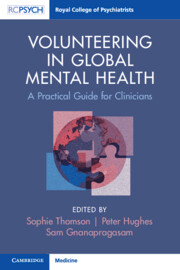Book contents
- Volunteering in Global Mental Health
- Reviews
- Volunteering in Global Mental Health
- Copyright page
- Contents
- Foreword
- Contributors
- Introduction
- Section 1 Key Principles, Theory and Concepts
- Chapter 1 Background and Principles of Volunteering in Global Mental Health
- Chapter 2 Humanitarian Emergencies
- Chapter 3 Ethical Issues in Global Volunteering: An Ethicist’s Perspective
- Chapter 4 Ethical Issues in Global Volunteering: Practical Considerations
- Chapter 5 Benefits of Global Volunteering to the United Kingdom
- Section 2 Practical Guide and Toolkit
- Section 3 Reflective Accounts and Perspectives of Global Mental Health Volunteering
- Section 4 Future of Global Volunteering
- Book part
- Glossary
- Index
- References
Chapter 1 - Background and Principles of Volunteering in Global Mental Health
from Section 1 - Key Principles, Theory and Concepts
Published online by Cambridge University Press: 08 November 2023
- Volunteering in Global Mental Health
- Reviews
- Volunteering in Global Mental Health
- Copyright page
- Contents
- Foreword
- Contributors
- Introduction
- Section 1 Key Principles, Theory and Concepts
- Chapter 1 Background and Principles of Volunteering in Global Mental Health
- Chapter 2 Humanitarian Emergencies
- Chapter 3 Ethical Issues in Global Volunteering: An Ethicist’s Perspective
- Chapter 4 Ethical Issues in Global Volunteering: Practical Considerations
- Chapter 5 Benefits of Global Volunteering to the United Kingdom
- Section 2 Practical Guide and Toolkit
- Section 3 Reflective Accounts and Perspectives of Global Mental Health Volunteering
- Section 4 Future of Global Volunteering
- Book part
- Glossary
- Index
- References
Summary
A purposeful, conscientious and well-intentioned mental health volunteer needs to be informed about the background, principles and ethics of global mental health in order to be impactful. This chapter provides background to aid such efforts and introduces global mental health within the wider voluntary context.
- Type
- Chapter
- Information
- Volunteering in Global Mental HealthA Practical Guide for Clinicians, pp. 9 - 21Publisher: Cambridge University PressPrint publication year: 2023



